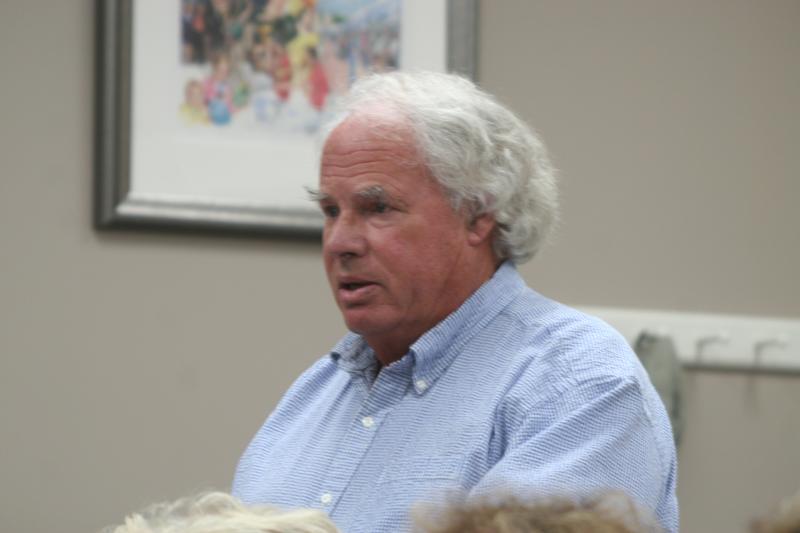Food trucks leave bad taste as businesses endorse nonprofits
Boothbay Harbor business owners and nonprofit volunteers gathered Aug. 14 to hear planning board members further discuss the possibility of an ordinance on mobile food vending.
Chair Tom Churchill said the board reached a consensus last meeting that barring mobile food on public property was probably a good thing, but dictating the type of business that can be done on private property is ill-advised. The board reiterated, selectmen directed it to look into the issue of mobile food vending, with no preconceived notions on whether it is a good or bad thing.
“The comment I found had a lot of credibility is 'What’s the problem we're trying to fix with this ordinance,” board member Bill Hamblen said. “If there's not a problem, then maybe this isn't a top priority thing to lean on …”
Current ordinances prevent activities like mobile food vending on public property like parks, parking lots, roadways and roadside parking. However, they are allowed to operate on private property if they get state licensing and local permits.
Churchill said the biggest problem was not being able to figure out how nonprofits should be treated when they set up food stands, grills and the like during big public events.
Rebuilding Together President Vic Taylor said it holds occasional food stands, for the public relations. “While the income from those is certainly helpful to us, the most important aspect ... is the public awareness and communication we get with the public when we are doing it … There's all kinds of activities that nonprofits do in this town that are their lifeblood, not because of the money, but because of the goodwill and communication with the public.”
Boat House Bistro and Mine Oyster owner Ralph Smith III said he is still against food trucks operating from public property, but believes the dichotomy of nonprofit vending and local business comes down to “being good neighbors.” He said business owners allowed their emotions to get the best of them at the last meeting.
“I don't think the intent was to squash all of these events … We can't take pies away from the church ladies and we can't take burgers away from Rebuilding Together. We can’t take anything away from people trying to raise money for the schools. (But) food trucks, I do believe, would be competition in a very skinny market for us. So, my opinion: I'm against it.”
Red Cup owner Dan Campbell and Dunton's Doghouse owner Gary Starankewicz agreed with Smith. Starankewicz said the conversation at the last meeting was all about the idea of food trucks and how local businesses do not want to see the extra competition. As for local nonprofits, “It's for our town … I'm for those guys and gals. What are we going to say to a church that's doing pies?”
Churchill asked the board where it should go with the selectmen's directive. Said member Margaret Perritt, “I think we need to leave well enough alone.”
Whoops and claps erupted from the crowd.
Code Enforcement Officer Geoff Smith said though mobile food vending can still operate on private property, it is not listed on the town's land use table. The board agreed to look at the issue and consider applying mobile food vending in the future.
Other business
The only application taken up was for Betty and Sewall Maddocks’ 23 Townsend Ave. property which Shannon Schmelzer rents to conduct business as Shannon’s Unshelled. The application requested an amendment to a previous application. Schmelzer sought more indoor seating and a food preparation space in the Maddocks’ property.
Schmelzer said these additional parameters would allow her to expand her seasonal operation and give her the space needed to move business indoors out of the cold. Schmeltzer said about 28 seats would be added, or slightly more depending on space.
Hamblen asked if the extra seating would put any more stress on utilities, specifically sewer. Betty Maddocks and Schmelzer said that while small changes may be made to the menu, it would not change consumption or waste.
The board voted unanimously in favor of the application.
Board members were presented with a preliminary diagram site plan involving a building at the 45 Juniper Road property of Michael and Lisa Derezin. Michelle Phelps represented the Derezins and showed the board a proposed 30% expanded footprint which brings the structure further away from the high tide mark, but not quite beyond the Department of Environmental Protection’s setback line.
Phelps explained the current structure is about 95% inside the 75-foot setback and the prohibiting factors for moving it completely behind the setback line are lot line configurations and ledge. There are no design plans yet for the structure, but the Derezins also want to plan for a full basement.
Asked if there would be blasting, Phelps said there would. Board member John Hochstein asked if it was essential to have a basement since the board can approve up to a 30% expansion, but does not have to grant it if structures can be better planned in accordance with state and local rules. Later, the board approved sending a draft of a blasting ordinance onto legal review.
Phelps explained that even without a basement, moving the building back will require ledge removal and raising the structure to ensure access. The ledge starts about five feet from the building’s closest point to a significant incline of ledge, said Phelps. “The grade is very abruptly moving vertically behind the building.”
The board decided a site review would help before the Derezins submit a formal application because it would give the board some context as to the limits of where the building can be moved.
Sarah Brewer came before the board with an application and business plan for her new home-based business, a state-licensed home kitchen where she prepares baked goods, confections, jams, jellies, pickles and other preserves. Brewer plans to sell her products online, at craft fairs and through wholesale retail in other businesses.
The board said her application is straightforward enough that she should be able to finish and submit it for approval at the next meeting.
































